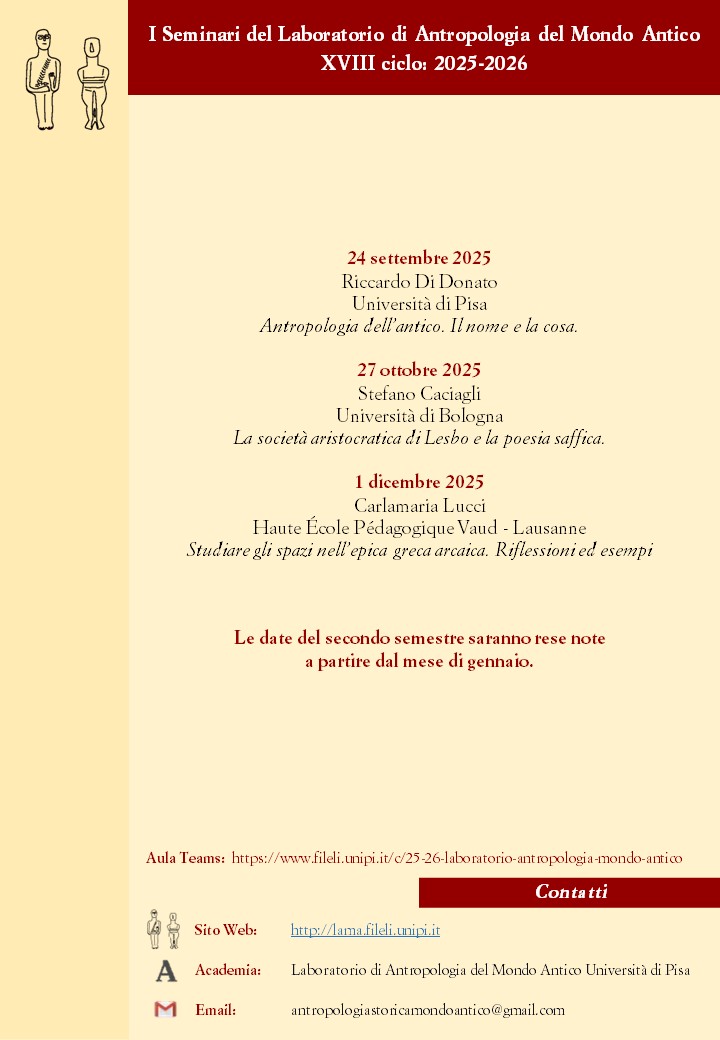C.f.p.: Between γελοῖον and σπουδαῖον: Comic Traces on the Tragic Scene” Cassino, 22-23 April 2020
Between γελοῖον and σπουδαῖον: Comic Traces on the Tragic Scene” Cassino, 22-23 April 2020
Dear all,
We are pleased to circulate, with the collaboration of the Centro Studi sul Teatro Classico (University of Turin), the Call for Papers for the conference “Between γελοῖον and σπουδαῖον: Comic Traces on the Tragic Scene” which will take place at the University of Cassino and Lazio Meridionale on 22nd and 23rd April 2020.
Scientific Committee:
Michele Napolitano (Cassino e Lazio Meridionale), Anna Maria Belardinelli (Sapienza – Università di Roma), Francesco Paolo Bianchi (Freiburg im Breisgau), Francesco Carpanelli (Torino), Lucio Del Corso (Cassino e Lazio Meridionale), Enrico Medda (Pisa), Patrizia Mureddu (Cagliari), Roberto Nicolai (Sapienza – Università di Roma), Maria Pia Pattoni (Milano Cattolica), Andrea Rodighiero (Verona), Maurizio Sonnino (Sapienza – Università di Roma), Matteo Taufer (Trento), Piero Totaro (Bari), Bernhard Zimmermann (Freiburg im Breisgau)
Call for papers pdf: http://www.teatroclassico.unito.it/sites/www.teatroclassico.unito.it/files/CFP%20-%20Conference%20Cassino%202020%20ITA%3AENG_0.pdf
The conference will accept papers concerning the following research fields:
• Comic implications in tragic characters: use of the comic-ridiculous effect about specific types of characters on the tragic scene.
• Comic traces in linguistic and stylistic expressions: comic interferences in the language and style of the tragic poets.
• Comic look: particular perfomances of the comic-humorous aspects in Greek tragedy.
• Comic intrusions in some tragic scenes: presence and purpose of comic elements in particular sections of the tragic plot.
• Comic echoes and tragic texture: modalities and aims of the use of comic motifs by the tragic poets.
• Comic effects on the audience: reactions of the spectators to tragic scenes with a comical tone according to the ancient exegesis.
Those who wish to present at the conference as speakers must submit the following documents (as PDFs only) to classics.conference.unicas@gmail.com no later than 30 October, 2019:
– an anonymous abstract (max. 300 words) of the proposed paper written in Italian or in English; in case of a collective panel (max. 3 papers) all abstracts must be attached as a single document along with a brief introduction.
– a brief curriculum vitae et studiorum which underlines University affiliation, degrees and relavant publications. The proposals will be selectedby the Scientific Committee based on quality and relevance to the conference. Candidates will be informed about the outcome of the proposals by December 20.

